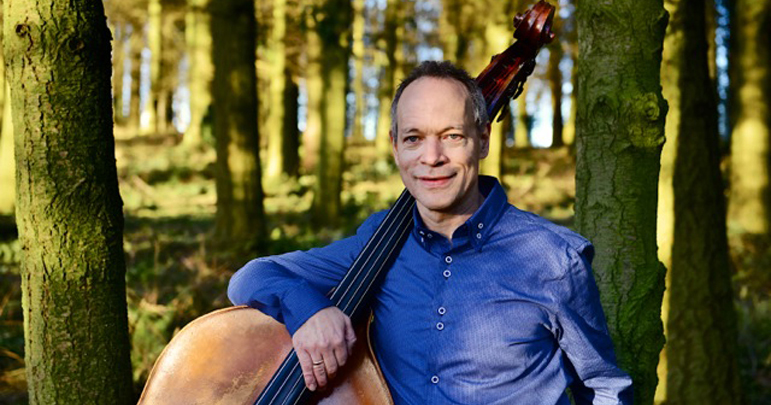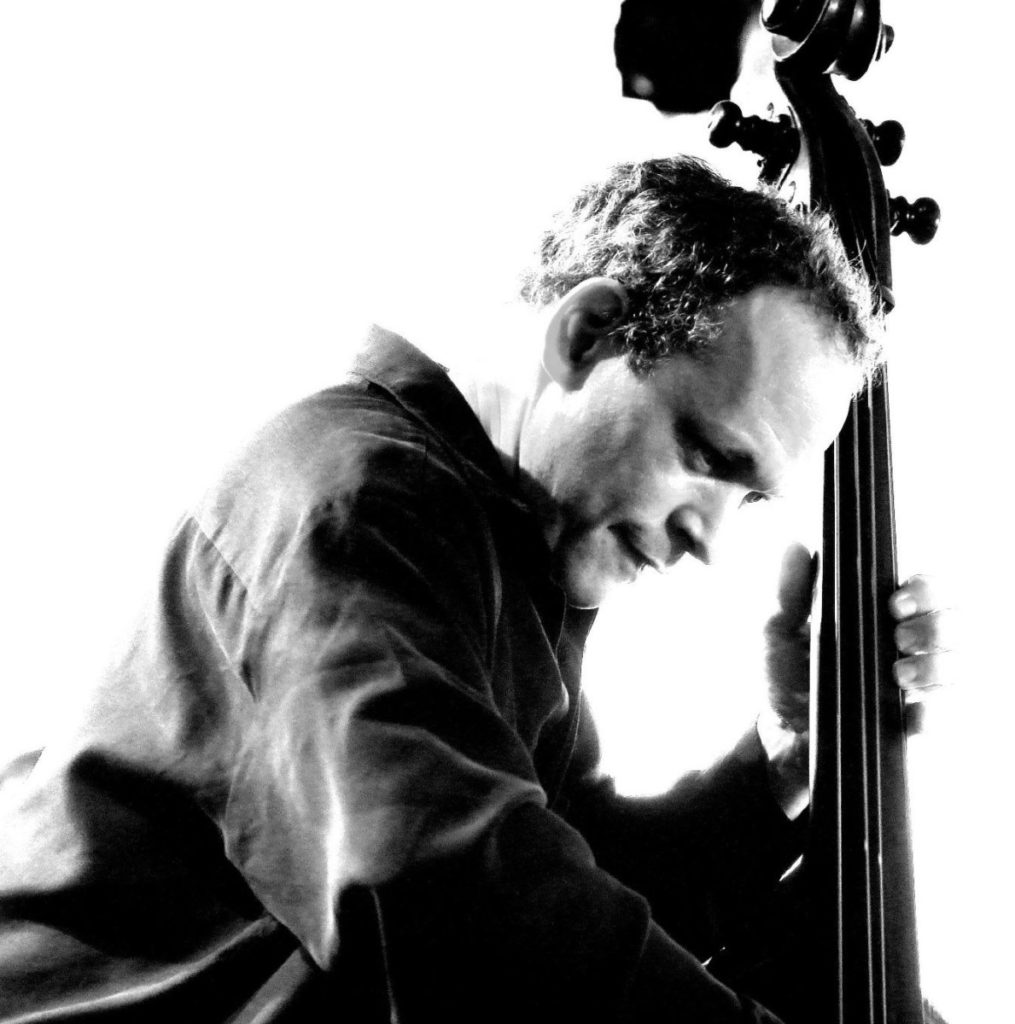A CHAT WITH: ALEC DANKWORTH
aaamusic | On 17, Oct 2017
Award winning jazz bassist and composer Alec Dankworth, son of Dame Cleo Laine and Sir John Dankworth, has led several groups of his own and worked with an extraordinary list of artists including Abdullah Ibrahim, The Dave Brubeck Quartet, Stephanne Grappelli and Van Morrison. His love of all things Spanish gave him the inspiration for his group Spanish Accents. Interviewer Anthony Weightman chatted to him at his home in The Chilterns.
Anthony Weightman: It’s that said you have a love of all things Spanish. I’ve thought of a few things: good climate, scenic beauty, fine wine, tasty food, a strong sense of family and flamenco. Have I missed anything out?
Alec Dankworth: Primarily music, but I learnt the Spanish language at an early age because, when we were kids, we had Spanish nannies. They taught us Spanish and we even went on holiday together, which ended in an interesting situation. Our parents were travelling round the world. They didn’t have a mobile phone or a phone line or an email to check where we were. Three weeks later they were saying “I wonder when our kids are coming back?” Eventually they got us back. We were very fluent by then! Since then I studied Spanish at school and still kept forgetting it. More recently I’ve tried to get it going again.
Anthony Weightman: As an ex Berklee College of Music student did you have the opportunity to study at their València campus in Spain?
Alec Dankworth: No, I didn’t. I’ve never been there, but I’d like to visit sometime. I’ve heard all sorts of things about it and I know a musician who teaches there. It’s great that Berklee has expanded internationally and encompassed the local music there. I was at Berklee for about 18 months from 1978 and that was an amazing experience. I turned up with my bass guitar and I was just about into jazz at that time. I’d only just started playing jazz on bass guitar and, through submersion, with 2000 other musicians under the same roof, it was an intense period of playing non stop.
Anthony Weightman: When photographer Brian O’Connor held an Images of Jazz exhibition in 2014 he said he enjoyed capturing emotion and expression and that you were in his top 10 of the most naturally photogenic musicians. Do you have any favourite photographic images of jazz?
Alec Dankworth: I confess that I’m not particularly a jazz historian, but there’s a picture of Art Blakey with his hands in prayer that I like.
Anthony Weightman: Last year you were part of a benefit concert to help unaccompanied children and the mothers and children who had been living in the poor conditions of the ‘Calais Jungle’. How do you feel about the continuing problems in Calais? People still being lured by the dream of a better life. The constant ritual of playing ‘cat and mouse’. Tear gas being thrown. People being injured.
Alec Dankworth: Ian Shaw, the vocalist, is very much involved with this. He was seriously hands on and going there 2 or 3 days a week. I play at the moment with Ginger Baker and the current percussionist, Abass Dodoo, is Ghanaian. He came to the UK many years ago and has amazing stories of people trying to get from Ghana to the UK. I hear first hand what people have to go through to get here and their experiences when they arrive. Obviously, it’s a ridiculous situation and I don’t see any cessation of it soon.
Anthony Weightman: I understand you’ve been part of sessions for the music of three films: Morning Glory, De-Lovely and The Mother. To an extent film music has to fit the expectations of others as well as being of quality. Do you feel that this is something that’s particularly difficult to do?
Alec Dankworth: The only music I’ve been involved in composing is the incidental music for a Harold Pinter play, Betrayal, which was on at the Donmar Warehouse. It was solo base music during the scene changes. It was quite challenging: having to make an instrument sound good which wasn’t meant to entertain on its own. That was fun. At the after show party I introduced myself with “Hello Harold” to which Harold Pinter replied “What’s all this first name stuff?” My Dad had worked with him decades before, so I hoped there might be a talking point.
Anthony Weightman: John Etheridge you’ve worked with. He’s seen as a gifted and eclectic guitarist who refuses to recognise artificial musical boundaries. Are those things part of the appeal in playing with him?
Alec Dankworth: Certainly, yes. I hope that those things would express my own musical sentiments. I’m interested in all genres of music, something my parents held dear as well. Over the years I’ve done all sorts of things with him. He was in Michael Garrick’s Fly By Night, a contemporary jazz group. He’s one of those musicians who has crossed musical genre boundaries. He’s always very lively and a pleasure to be with and play with.
Anthony Weightman: You’ve worked extensively with Ginger Baker’s Jazz Confusion. Ginger Baker is sometimes described as a gifted perfectionist who’s wild, nervous and confrontational. It’s sometimes said that some of his qualities have been slightly exaggerated. How would you describe him?
Alec Dankworth: I guess he’s a lot mellower than he has been in past decades. He’s been through a lot of physical problems. I think he’s passionate and serious about his music and his roots as a jazz drummer. The whirlwind of Cream took off. His heroes are all the jazz greats. I’ve enjoyed working with him and the others in the band. It’s been very challenging to make it work, but I think it’s been successful. There’s no keyboard or guitar in the band, which means I get lots of solos. Unfortunately Ginger had a bypass operation last year, so we’ve had a hiatus of gigs recently. Hopefully, next year, we’ll get going again.
Anthony Weightman: There’s a wonderful picture of the unveiling of your father’s statue outside The Stables theatre in Milton Keynes. Personally I love it because his energy and enthusiasm comes through, but also the apparent pleasure seen in the faces of his family. Do you feel it accurately reflected his personality?
Alec Dankworth: Yes I did. His finger’s pointing towards the entrance. I don’t know whether that was intentional. I think it did capture his personality. The sculptor gave my mother a bust first to check that he was on the right track. I remember Mum saying: “I didn’t marry that person!”, so he had to do a few tweaks, but he got very close by the end of it.
Anthony Weightman: You seem to have a very open minded attitude towards music. Some people say they don’t like jazz. They claim it’s aloof, self-indulgent, intimidating or a discordant noise they feel they can’t relate to. What do you think about those sort of criticisms?
Alec Dankworth: Well, they’re probably valid for the people who make them. Everyone has their own feelings about music and music has to communicate with people. There’s certainly an interaction going on there. They’re saying: “I don’t bloody like it. Turn it off!” It happens to all sorts of genres of music. It’s hard to be objective about that. As a musician you’re not listening to the music in the same way. I do go to jazz concerts, but not that often. Sitting in a cold, uncomfortable jazz club trying to enjoy yourself may not be fun, Certainly playing the music is a completely different thing. What is horrible to listen to may be good fun to play and possibly vice versa. I guess jazz is a minority music. It’s not ‘popular’, but maybe it was during my Dad’s time. The Beatles came along and things changed for the good. There are plenty of jazz musicians who loathe The Beatles, just because they put them out of work.
Anthony Weightman: At times there are some quite personal insights into the Dankworth family by the press. Are you fairly resigned to this as something that goes with the territory of being in the public eye or would you prefer a little more privacy?
Alec Dankworth: I don’t really read the press, so I don’t really know. I haven’t seen anything recently of a personal nature that has bothered me.
Anthony Weightman: Both of your parents were invited onto Desert Island Discs to talk about their influences and inspirations. Would you welcome that invitation?
Alec Dankworth: I guess I would, yes. I don’t see why I should be invited, but I’d welcome it. I’ve done similar things like choosing ten tracks. It always takes me a bit of time. You have to concoct the tracks and the reasons for choosing them. The other part of the show is, hopefully, an interview which gives a little bit of insight into your life.
Anthony Weightman: Are there artists you haven’t worked with that you’d like to work with in future and why?
Alec Dankworth: Well, I have worked with a lot of people, which I’ve been very lucky to do and been thankful for. None of them were on my wish list. I’ve never really had one. What do they call it? A bucket list? Is that an American term? I remember seeing a CV of a colleague years ago. His CV was literally nothing but a list of people he had worked with. Highlights for me would include Abdullah Ibrahim, the South African pianist. His music had a spiritual element. He came from such an oppressed country and the music he made reflected that. You could feel it. It came out in the music. We played in Johannesburg town hall just about 6 months before Nelson Mandela was elected. It was a pretty heavy duty time in the country. Also Dave Brubeck I played with for three years. That was an amazing experience and equally spiritual in a certain way. He’s a legend in the jazz world.



